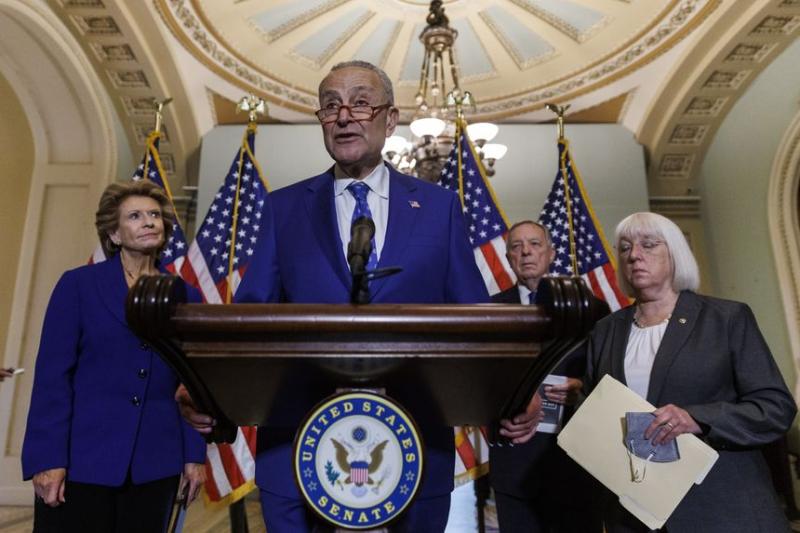A Sensible Senate Gun Deal - WSJ



The Senate voted 64-34 late Tuesday to debate a bipartisan gun violence bill, and its principal virtue is that it focuses on the source of too many mass shootings: young, troubled men.
The bill covers three main areas: money for states to implement so-called red-flag laws and beef up mental-health services; money for enhanced school safety; and additional scrutiny of gun buyers who are under the age of 21 or domestic abusers, as well as enhanced penalties for purchasing a gun as a straw buyer or trafficking in guns.
The Senate deal is a long way from the gun-control package that Speaker Nancy Pelosi rushed through the House two weeks ago. That bill is a nonstarter in the Senate, with some Democrats and nearly all Republicans opposed. GOP negotiators led by Texas Sen. John Cornyn also blocked several Democratic Senate demands, including a ban on the purchase of so-called assault weapons for anyone under age 21, licensing requirements, and mandatory waiting periods for all buyers.
One useful provision in the bill would correct a hole in background-check screening for those under 21. The current system doesn’t access juvenile records, though those records often contain mental-health or criminal histories that would bar an adult from obtaining a firearm. Mental-health problems often appear before age 18, and mass shooters with disturbing records have bought guns legally.
The compromise will push into the background-check system only juvenile records that are “disqualifying” for a gun purchase under current federal firearms statutes. There are no mandatory waiting periods, though the FBI would have up to 10 days to investigate possibly disqualifying juvenile records. Eighteen-year-olds with no troubling histories will have no difficulty passing the background check.
The deal would also give money to states to implement red-flag laws, which let courts remove firearms from individuals deemed a danger to themselves or others. The state laws must contain due-process protections—including the right to an in-person hearing, to know the evidence used to justify a red-flag order, and to have counsel present. States that don’t pass red-flag laws can use the money for other crisis-intervention programs, such as veterans, drug or mental-health courts. The legislation also devotes $240 million to mental-health support for children, $60 million to better train primary care providers in mental-health issues, and $150 million for suicide prevention.
The bill also changes the background system’s “boyfriend loophole.” Currently, only domestic abusers who are married to, living with, or have a child with a victim are barred from obtaining a firearm, and the left wants that definition expanded. The bill expands this to cover those in a “dating relationship,” defined as individuals who “have or have recently had a continuing serious relationship of a romantic or intimate nature.” The change won’t be retroactive, and the bill lets certain first-time offenders regain the ability to purchase after five years.
The one sour note is the rush to pass the bill. Negotiators had barely unveiled the 80 pages of text on Tuesday before Majority Leader Chuck Schumer held the vote to proceed. Democrats want to move on to another tax-and-spend reconciliation bill, but legislators deserve time to consider the biggest change in gun and safety laws in decades.
The Senate compromise makes sense politically for both parties. Democrats can claim progress on the issue after decades of failure, while Republicans can point to their bipartisan cooperation and then focus on the economy and other issues in the fall campaign. The gun lobby and those who want to ban guns aren’t happy, but the bill preserves gun rights while trying to keep guns away from the dangerous. That’s a step forward.

Tags
Who is online
105 visitors

I agree with the editorial board. This is progress. A small step forward.
Yeah, I can agree but I think it's also a small step indeed. I would liked to have seen more put into the background check system, put some teeth into the system for insuring that all states and reporting agencies get the data sent in in a timely manner. The NICS system is only as good as the data it holds and when a reporting agency is lax on sending in data the system misses things. As for the red flags, I do like them so long as due process is followed as part of it.
There’s undoubtedly more that could be done, but I’ll take a modest compromise step over doing nothing at all. This won’t solve all gun problems, but it could solve some.
It's sad when the "law makers" don't know what laws are on the books and just arbitrarily add more BS to the pile. The whole thing they are pushing for already exists under 18 U.S.C. § 922.
If people would only learn to research and read.
I agree that on its face, this section would seem to apply to anyone convicted of DV. However, the loophole exists in a different subsection. It’s in 18 USC 921(a)(33) where “misdemeanor crime of domestic violence” is specifically defined.
Note that none of the bolded section would apply to a boyfriend, i.e. someone a person has a more casual relationship with - meaning, as per this section, that they aren’t a former or current spouse, aren’t a guardian of the victim, aren’t a person with whom the victim shares a child in common, aren’t someone living with the victim, or something similar.